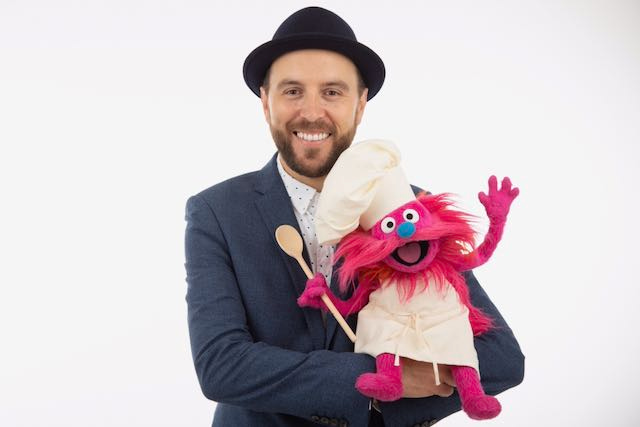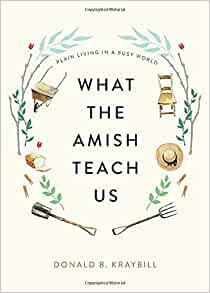What is Dharma?
How an ancient Indian concept applies to the creative arts, with insight from puppeteer Warrick Brownlow-Pike, Jay Shetty, and the Amish.
Good morning everyone and welcome back to the Quarantine Creatives newsletter, a weekly companion to my podcast of the same name.
This newsletter is free and delivered weekly to inboxes, so if you like what you’re reading, please consider subscribing!
In today’s newsletter, I look back on my interview from last week with Warrick Brownlow-Pike and consider the lessons his story has on purpose and mentoring.
What is Dharma?
For fans of 1990s sitcoms, dharma conjures up a specific memory, or more specifically Dharma with a capital D does. Dharma Freedom Montgomery was Jenna Elfman’s character on the ABC’s Dharma and Greg for five seasons.
Today’s newsletter is all about finding your dharma, but that really has nothing to do with that Dharma. I’m sorry if I lured you in with the hope of reliving classic sitcoms. (For that, you’ll want to read this.) But now that you’re here, let’s dig in!
Dharma is a concept which originates in Vedism, an ancient religion from India.
Jay Shetty, the former monk turned lifestyle guru, first introduced me to dharma. Here’s how he describes it in his best selling book Think Like a Monk:
Dharma, like many Sanskrit terms, can't be defined by a single English word, though to say something is "your calling" comes close. I see dharma as the combination of varna and seva. Think of varna (also a word with complex meanings) as passion and skills. Seva is understanding the world's needs and selflessly serving others. When your natural talents and passions (your varna) connect with what the universe needs (seva) and become your purpose, you are living in your dharma.
That’s the longer, more complicated definition, but he also boils it down to this easy to remember formula:
Passion + Expertise + Usefulness = Dharma
In order to live the best version of your life, you need to find something that the world needs, that you know how to do well, and about which you are passionate.
Again, quoting Jay Shetty:
If we're only excited when people say nice things about our work, it's a sign that we’re not passionate about the work itself. And if we indulge our interests and skills, but nobody responds to them, then our passion is without purpose. If either piece is missing, we’re not living our dharma.
I want to be clear that living your dharma does not have to be a professional pursuit. You may have a job to pay the bills which also allows you the free time to volunteer at a food pantry, perform music in a band, or write novels.
However, what provides financial stability and what sparks creativity are often one and the same, especially in the entertainment and media businesses.
It can take years of work to discover our dharma, although a lucky few of us are able to find it young.
The Role of Nurturing
My guest last week on the podcast was puppeteer Warrick Brownlow-Pike, who has worked on Sesame Street and many CBBC shows in the UK. Warrick was fortunate to discover his calling very early in life.
“I first got bitten by the Muppet bug at the age of two. I saw The Muppet Show and it was just everything I needed and wanted. So I was obsessed and have been since that age.”
Not only was he a consumer of puppet-based entertainment, but he also became a creator of it from a very early age.
“I had puppets from the age of two onwards. Around the age of seven or eight, we’d make our own puppets. Around the same age, my parents bought a video camera so I could do puppets on the camera.”
Warrick had a passion, and the good luck to have supportive parents that allowed him to explore it. But he needed to gain skills to turn that passion into his calling. That came through years of self-taught play with home video cameras and puppets.
“I really learned by lip synching to records. I’d run over, put a record on, put the pin on, get it going, jump over in front of the camera, and then just let the album play out and lip sync along. And think about all the breaths in the performance and the intonation and how the movement of the puppet should sync up to that voice.”
That practice paid off when he got hired by CBBC (the BBC network geared towards children) to perform puppets. He had the passion, he had gained the expertise, and now he had the usefulness. His work was being seen by children across the UK, making them laugh and teaching them. Dharma.
His biggest character in the UK has been Dodge the Dog, who first appeared in interstitial segments on the network, and now stars in CBeebies House. Here’s some highlights from Dodge’s time on air:
Warrick has had many celebrity encounters in his years playing Dodge, perhaps none more memorable than meeting Queen Elizabeth II when she toured the new BBC production facilities.
Warrick had his own fears about meeting the Queen, but he was able to channel that through his puppet to be less nervous.
“This is the most famous woman in the world. She’s the lady that’s on the money in our pockets. I was nervous as me to be me, but then as soon as we had those puppets on, fine. He knows what he’s doing, he can deal with it, he’s not nervous, he’s a dog, he doesn’t care.”
Warrick also originated the role of Gonger on Sesame Street, Cookie Monster’s chef friend in a new segment that teaches kids how to cook. Gonger first appeared in the UK Sesame spinoff The Furchester Hotel in 2014, but became a fixture on the main show beginning in 2017.
Gonger has become a fast sensation, including with my kids. Warrick described the feeling of watching the mania surrounding Gonger:
“It’s absolutely mind blowing to me. I don't think I’ll ever get over it. There was a figure set with all the classic figures in it and Gonger was in there, I was like, come on, what is this April 1? I was the guy who bought all that stuff and now my guy’s in with them.”
The Role of Mentors
Warrick exemplifies somebody who is not only passionate, but willing to foster that passion in others.
I wrote in a past newsletter about how my kids wanted to learn about green screens, so we built one and tested it out. I had tagged Warrick in a post on Instagram about this process.
Warrick could’ve simply favorited my post and moved on with his day, hardly even noticing what I had written. Instead, he reached out via DM and was excited to share his love of puppetry with my family.
He sent me a photo of the same scene that my kids and I were trying to recreate, and they were thrilled when they got to see how the actual shot was made. The discussion we started over DM culminated in the podcast interview a few weeks later.
Warrick is clearly a natural teacher, perhaps a function of how he learned growing up. He had real-life puppeteers as mentors, but he also studied behind-the-scenes books, magazines, and documentaries that showed how his favorite shows were created.
To this day, he is very deliberate about how he frames his photos for social media, knowing that aspiring puppeteers may be following him:
“If I’m watching my friends perform and I take those photos, I’m always trying to frame up the photo to the way that I saw them as a kid in those books because I’m just so interested in what’s happening below the frame.“
Now that Warrick had established himself, he has become a mentor to other young people that want to learn the craft.
We Need Mentors
As I think about dharma and the role of mentors in helping us find our dharma, my mind turns, surprisingly, to the Amish.
Perhaps this is because I have been reading Amish scholar Donald Kraybill’s new book What the Amish Teach Us, which contains very accessible essays about how the Amish approach life differently from others in American culture.
Kraybill points out the role of apprenticeships as one big difference. Amish children learn from an early age by shadowing their elders, be it family members or others in the community, while most other American students study diverse subjects in school and may not focus on an expertise until their late teens.
Amish children may naturally gravitate towards certain vocations (their passion) and they rely on mentors to help foster those skills (expertise). If there’s a usefulness for their skills, they have a career, and also, are living their dharma. An ancient Vedic concept manifested in a traditional Christian context. It’s funny how so many world religions have such a similar core.
Kraybill describes the importance of the mentor-apprentice relationship:
In the Amish world these old-fashioned apprenticeships matter. They are the seedbed for budding entrepreneurs. The Amish have always endorsed a hands-on, practical education that emphasizes trial and error, hard work, responsibility, and accountability. This commonsense system has run smoothly for decades, so it's not surprising that the Amish continue to rely on it for training their youth.
Mentorship is so important in any field, but especially in the creative arts where the barriers to entry can be high and the rules not always published.
Mentorships can be formal or informal. I have relied on the expertise of many as I journeyed outside of my comfort zone by starting this podcast, which has now had 90 episodes! Sometimes a short email at the right time from an informal mentor is all that’s needed.
I also try to chat with anybody who reaches out to me for advice. I may not have the answers, but I am happy to share my journey.
And perhaps that’s the larger lesson to take from all of this- we are all learning for our entire lives. Nobody has figured it all out, but we’ve all figured out little pieces that have worked for us and that might help others.
Had Warrick not taken the extra step to reach out to me via DM and share some information, you wouldn’t be reading this newsletter that is somehow about puppetry, Vedic concepts, and Amish apprenticeships. But hopefully you’re learning something from it.
In this age of social media, mentors are more accessible than ever before. Why not take a moment to try to reach out to somebody you admire and see if they might be able to help you? Or better yet, think of who might benefit from your expertise and offer to help them. After all, the only way we truly get to live our best life is by helping those around us.
Incidentally, that’s another hallmark of Amish culture. But we’ll save that for another day.
I hope you’ll have a chance to listen to my full interview with Warrick, which has lots of great insights. I also hope that this newsletter may have helped you think more about dharma, how you can discover it for yourself, and how you can foster it in those around you.
I have exciting news to share: You can now read Quarantine Creatives Newsletter, along with lots of other amazing newsletters in the new Substack app for iPhone.
With the app, you’ll have a dedicated Inbox for my Substack and any others you subscribe to. New posts will never get lost in your email filters, or stuck in spam. Longer posts will never cut-off by your email app. Comments and rich media will all work seamlessly. Overall, it’s a big upgrade to the reading experience.
The Substack app is currently available for iOS. If you don’t have an Apple device, you can join the Android waitlist here.
If you have questions, comments, thoughts, ideas, or anything else that you’d like to share, please feel free to email me anytime.
If you’d like to catch up on past episodes of the Quarantine Creatives podcast, they can be found on Apple Podcasts, Spotify, or wherever you listen.
Please consider sharing this with a friend that you think might enjoy reading this, or better yet, share it on social media so you can tell hundreds of friends!
If you’ve missed past issues of this newsletter, they are available to read here.
Stay Safe!
Heath














